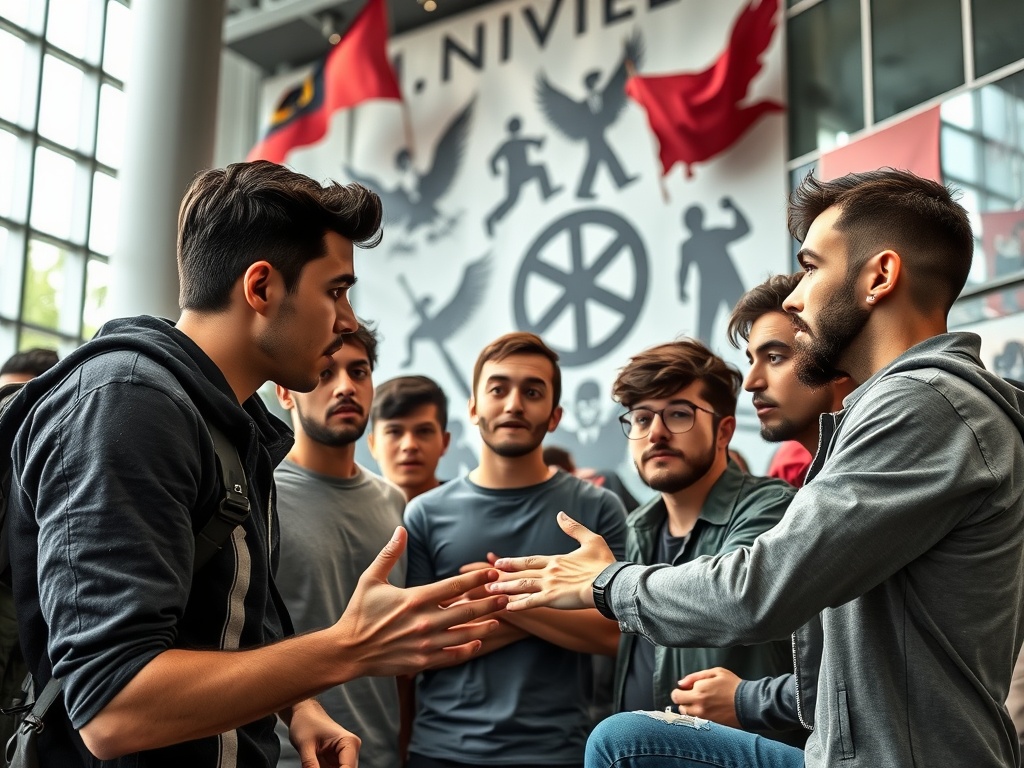Extremism—specifically extreme right-wing (ERW) narratives, along with misogyny and racism—poses an increasingly serious threat to young men in the UK, as highlighted in a recent report from the Home Office. John, a 28-year-old from the northwest of England, found himself radicalized by the ERW at the tender age of 14. His behavior raised enough concern that he was referred to Prevent, the counter-terrorism initiative that has faced scrutiny for its premature closure of Axel Rudakubana’s case; Rudakubana would later go on to commit the tragic act of killing three children in Southport.
In this piece, John shares his experiences alongside his mother, Sarah, who is in her forties, discussing the events that unfolded and how their relationship transformed as a result.
Sarah
When John was a little boy, he was an absolute joy to be around. I became a single parent at 22 and worked in retail, and while his father was absent, John’s grandparents lavished him with love. He was fortunate to have positive male role models in his life—his uncles and close family friends. When John turned nine, I entered a new relationship, and he developed a wonderful bond with my partner. Each day, friends would come knocking on our door for him, and he’d return home covered in mud, with slugs in his hair from climbing trees. His love for shows like Thomas the Tank Engine and Teenage Mutant Ninja Turtles was infectious. He had an incredible ability to find joy in life and was always quick to make me laugh. His kindness was evident; he would often ask, “Mum, can I take crisps for everyone?” and return with a whole multipack to share. Everyone praised his manners, and I felt incredibly fortunate.
As he grew older, John began spending more time on his computer, but I believed I was keeping him safe, knowing he was just in his bedroom.
John

I always had a tight-knit group of friends, but I struggled academically and felt lost about my future. The pressure to excel in GCSEs, then college, then university felt overwhelming without a clear direction. Frustrations mounted, especially regarding the unfairness of earning less than older workers at minimum wage. At 14, a friend showed me a meme stating, “If you think British soldiers shouldn’t be on the streets, share this post.” With my uncle having served in the armed forces and suffering from mental health issues upon his return, I felt the Government was failing him.
The meme fed into a narrative filled with anger: stories of a “Muslim family given a seven-bedroom house” or the notion that the UK was sending billions in foreign aid to build mosques. Though all of it was fabricated, I didn’t think to verify the claims—it all felt too real. This sparked a growing rage within me, leading me to spend more time online, where the ERW seized on my frustrations and directed my anger towards the Muslim and Asian communities.
Sarah
Before, John had no political inclinations; his most heated debates were about school shoe colors. So when he began changing during his teenage years, I was at a loss. He became irritable, argumentative, and disrespectful, but I chalked it up to typical teenage hormones. Friends had warned me that our relationship would shift as he matured, but the decline was so subtle that I failed to recognize the warning signs. The ERW encouraged him to remain tight-lipped, so nothing overtly revealed his new beliefs. He wasn’t outspoken or overtly opinionated at home; things simply felt different. In hindsight, it resembled being in a narcissistic relationship: initially, they shower these boys with affection, making them feel uplifted, which isolates them from those who genuinely care.
I had never heard about the dangers of radicalization. As parents, we are forewarned about sexual predators, knife crime, substance abuse, and bullying, but not this. For my generation, growing up without computers, I approached his online activities with misplaced confidence, believing he was safe just playing games or chatting with friends upstairs.
John

The groups emphasize brotherhood, fostering a sense of loyalty and mutual protection. This overwhelming feeling can be intoxicating. I believed that by remaining inactive, I would be letting down family members who had fought in previous wars. I felt I was partaking in a larger battle, one that would eventually garner familial support.
Sarah
Teachers began calling weekly, reporting John’s disruptive behavior—he was argumentative, neglecting homework, and they sensed something was awry but couldn’t pinpoint it. Was he being bullied? Did he have girl troubles? No one informed me of any incidents suggesting radicalization. By this point, my relationship with John had deteriorated to the point where I felt he loathed me. Even simple questions like “What do you want for dinner?” would ignite arguments. It wasn’t until he turned 17 that I began to grasp the gravity of the situation.
One Saturday, John mentioned he was going to watch football, and I was thrilled since he hadn’t done that in ages. Later, when I asked about the match, he revealed he had actually attended a demonstration. “You wouldn’t understand,” he retorted when I pressed for details, and when I inquired further, he called me stupid and thick, pulling away into anger. His parting words were that there would be another demonstration soon, and he would go regardless of my opinion. My partner and I felt helpless. We attempted dialogue, but it led nowhere, and eventually, we devised a plan to offer him a ride to the next demonstration so we could see firsthand what was happening. I told John I wouldn’t participate, as it was about grooming gangs, but I would drive him. He agreed, and on the way, he engaged more than he had in months. We let him out and parked across the street to observe discreetly. Within moments, I witnessed him marching and chanting racial slurs, a look of pride illuminating his face. In that moment, I realized just how dire the situation had become.
John

Attending these demonstrations offered an exhilarating adrenaline rush, knowing opposition groups and police were present. The thrill lasted only a short time, soon replaced by paranoia—fearful that photos might surface, exposing my identity and risking my future. Regret filled me, especially after one incident when we targeted a young Muslim woman with two children nearby. Others were flicking alcohol at her and hurling horrific insults. I could see the terror in her eyes and regret not intervening. I also despised how the ERW targeted athletes, disparaging them solely based on their skin color, even going so far as to insult Conor McGregor as “IRA scum” simply for being Irish.
Sarah
If I thought the demonstration day was bad, things only escalated from there. Arguments at home became unrelenting. John insisted that certain verses from the Quran had negative meanings, and I would lose my temper, screaming at him to reason with me. I even entertained the idea of bribing him to change his views. The tension was palpable; I found myself crying on the bus after work, feeling scared and miserable, hardly eating. My eyes were either red from tears or darkened from sleeplessness.
I contemplated going to the police or talking to the school, but I feared it would result in his expulsion or him leaving home. I still didn’t fully grasp how radicalization worked. He was consuming over 16 hours of ERW material daily, and I was unwittingly enabling his behavior by not reporting him. I thought I was protecting him.
As he became more vocal about his views, he began arguing with family members. People would tell me that I needed to discipline him, saying things like, “Sarah, you need to give him a slap, a strong talking to.” I felt increasingly isolated.
John

I stopped caring about being discreet. Long-term friends began distancing themselves, and I couldn’t blame them; I was often aggressive or made racist remarks. My family also began telling my mother they wouldn’t speak to me. Even now, I still don’t communicate with some of them. I was so entrenched in the ideology that I failed to reflect on the damage I was causing my family. My turning point arrived after a troubling incident at college. I made a series of racist comments and was sent to safeguarding. Furthermore, I offered a peer a far-right sticker while inviting them to a demo. That was when I was referred to Prevent, the government program designed to mitigate radicalization.
Sarah
The day John met with Prevent, I was terrified. I knew how volatile he could be when confronted, and I feared he might explode and face expulsion. I was on edge the entire day. When he returned home, however, he told me that the meeting had gone well. They had cleverly paired him with someone who shared his interest in football, and instead of reprimanding him, they engaged him in meaningful conversation. This individual provided John with a valuable resource: a Quran translation app for his phone, allowing him to explore the religion on his own terms.
John

During this period, I encountered numerous quotes and passages that I had been told conveyed specific meanings. With the app, I began to understand that many of those interpretations were misleading or taken out of context. I delved deeply into the study of Islam and discovered that it fundamentally promotes peace, which eroded my capacity for hate. My doubts about the ERW brotherhood began to surface; when I reached out for support, many would simply hang up on me. They had failed me at my time of need. I realized that the supposed brotherhood was a one-way street, offering nothing but empty promises.
Eventually, I severed all ties with the group and changed my phone number, eliminating all contact. My involvement had become utterly pointless, leaving me with a multitude of regrets. The memories of the things I witnessed and participated in will haunt me for life. Since leaving, I’ve recognized the lengths to which the ERW goes to recruit young individuals—some groups organize camping trips for youth or even design video games with themes as disturbing as concentration camps or Nazi versions of Monopoly.
Sarah
The time between that demonstration and John’s departure from the ERW spanned six to eight months. It was a pivotal moment when he realized he had been deceived and manipulated. Many people believe that exiting such groups is the hardest part, but I argue that the true challenge lies in the aftermath—rebuilding relationships.
Since then, I’ve connected with other parents facing similar struggles; the youngest child I encountered was just eight years old, radicalized by an older sibling. We urgently need more educational resources in schools, as this issue continues to grow. Parents must also understand that seeking help will not lead to punishment for their child. The ERW thrives on the silence of families, and this plays directly into their hands. The sooner we address these issues, the less damage can be inflicted, not only on individuals but also on families and the broader community.




